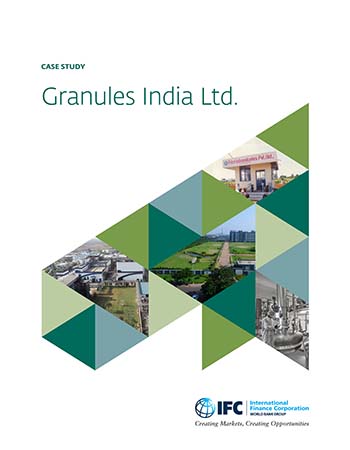Granules is among the most consistently innovative companies in the generic pharmaceutical industry. It is known for building upon the concept of Pharmaceutical Formulations Intermediates (PFI) and producing them at a large scale. This allows the firm to provide premixed ingredients to pharma companies around the world at high speed efficiency and low cost, thereby ultimately making medications less expensive and more readily available.
Granules is based in India but it always has been oriented toward global customers, producing PFIs and tablets for pharmaceutical companies in the United States, Europe, and elsewhere. Granules has grown consistently and steadily through its 30-plus year history, focusing on a few niche products like PFIs for painkillers and diabetes medications. In 2017, the company began a major strategic expansion by opening a Virginia-based research and development facility, and developing a portfolio of lower-volume, higher-premium medicines, especially Extended Release Controlled substances, which cannot be imported into the United States.
Granules distinguishes itself by combining research and development and operational effectiveness. In many companies, there is a perceived tradeoff between these two practices. Granules sees them as reinforcing each other. Its frugal operational efficiencies have allowed it to “shave pennies,” as one interviewee told us, from every production cycle, and therefore keep prices lower than competitors while raising quality. Its factories are currently running at 98 percent efficiency and constantly striving for more.
In its efforts to improve its manufacturing processes, Granules has adapted innovations from other sectors such as candy and detergent. It has used team-based disruptive innovation models that are usually found in technology companies. The company's willingness to look outside its own industry has contributed to its success; Granules holds around 50 percent market share in the United States and a significant global market share for its top three products: ibuprofen, acetaminophen, and Metformin and their combinations.
The Granules story makes the case that middle-sized, scale-up companies that focus on long-term growth, rather than short-term profit can be an essential driving force in bringing prosperity to emerging economies. These companies are the providers of goods and services from which innovation comes, often targeted to industrial or commercial niches that larger enterprises overlook. They may provide opportunities for employment that are well-suited to their locales. They are often more flexible and resilient than any other type of company, and they have distinctive business personalities that reflect the attitudes and predispositions of their founding families. They may also be audacious enough to take on a global customer base and purpose. In short, they may be like Granules India Ltd.
Timeline
Lessons
Granules has introduced some of the most influential manufacturing and operational innovations in the generics pharmaceutical industry. It excels in adapting ideas from other large- scale manufacturing industries to expand and enhance its pharmaceutical operations, while maintaining regulatory compliance.
Like the Japanese auto industry in the 1970s, Granules has turned efficiency and operational effectiveness into a baseline for growth. For innovative companies, especially those with variable margins, frugality of this sort provides a safety net: it makes large investments less risky.
Granules is a global company, serving mainstream or generic pharma brands in the United States and Europe. To avoid overreach, it has operated within deliberately chosen constraints. At first, Granules limited its growth to a few well-established compounds, and then, it scaled operations through a carefully delineated series of manufacturing innovations
Granules takes care to help its employees raise their quality of life. When it hires engineers, it trains them in the entire manufacturing life cycle, making them much more versatile, employable, and committed to quality than they would otherwise be. And for the factory floor, it has pioneered an extensive life-skills program that helps high school graduates in rural India build a career path to a middle-class life.
The Granules response to the COVID-19 crisis was immediate. It took steps to protect the workplace environment, guarding employees against contagion and it ramped up manufacturing activity so that it could help its customers meet the rising demand for pharmaceuticals during the pandemic.
Conclusion
It’s telling that the leaders of Granules see their company as one of many innovative middle-sized companies in India, poised to help take their country into global business leadership. As supply chains around the world decentralize and move away from reliance on any particular country or region, the ability of middle-market enterprises to fill the gap will be all the more important. The Granules example shows how that can be done , through the combination of ingrained innovation and operational excellence.
The culture of the company is at once matter-of-fact and aspirational. The leaders make a commitment to excellence in everything they do—from pharmaceuticals to wine making, and to their employees’ learning and development. As a result, they have introduced some of the most influential manufacturing and operational innovations at scale in the generics pharmaceutical industry. Having shown that they could maintain growth during the Covid-19 pandemic, Granules is now potentially positioned as an enterprise of significance in the years that follow, both for their industry and their region.

Read Full Case Study
DOWNLOAD
